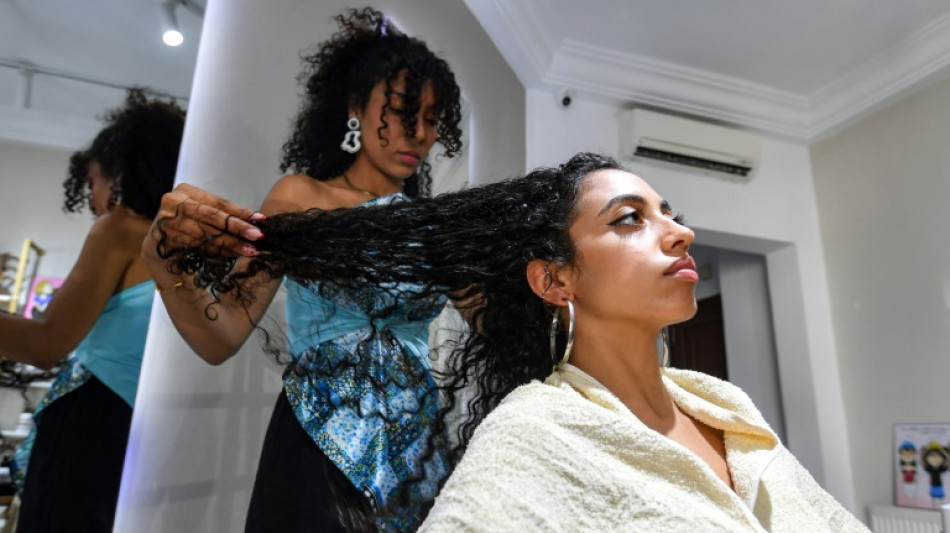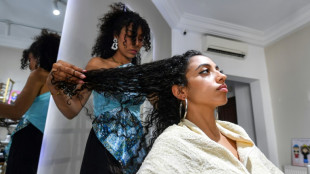
-
 Suspended Thai PM in court for case seeking her ouster
Suspended Thai PM in court for case seeking her ouster
-
Errani, Vavassori retain US Open mixed doubles title in revamped event

-
 Surging tourism is polluting Antarctica, scientists warn
Surging tourism is polluting Antarctica, scientists warn
-
Ten Hag hoping for fresh start at rebuilding Leverkusen

-
 Five players to watch at the Women's Rugby World Cup
Five players to watch at the Women's Rugby World Cup
-
Suarez fills Messi void as Inter Miami beat Tigres 2-1

-
 Asian markets creep up as investors await key speech
Asian markets creep up as investors await key speech
-
New Zealand spy service warns of China interference

-
 Brazil police accuse Bolsonaro and son of obstructing coup trial
Brazil police accuse Bolsonaro and son of obstructing coup trial
-
Israel approves major West Bank settlement project

-
 North Carolina braces for flooding from Hurricane Erin
North Carolina braces for flooding from Hurricane Erin
-
Pensioners on the frontline of Argentina's fiery politics

-
 'Curly is beautiful': Tunisian women embrace natural hair
'Curly is beautiful': Tunisian women embrace natural hair
-
Sudanese lay first bricks to rebuild war-torn Khartoum

-
 Newcastle host Liverpool amid Isak stand-off, Spurs test new-look Man City
Newcastle host Liverpool amid Isak stand-off, Spurs test new-look Man City
-
Texas Republicans advance map that reignited US redistricting wars

-
 South Africa spinner Subrayen cited for suspect action
South Africa spinner Subrayen cited for suspect action
-
Meme-lord Newsom riles Republicans with Trump-trolling posts

-
 Messi ruled out of Miami's Leagues Cup quarter-final v Tigres
Messi ruled out of Miami's Leagues Cup quarter-final v Tigres
-
Trump flirts with Ukraine security, with narrow margins

-
 US sends three warships near Venezuela coast
US sends three warships near Venezuela coast
-
Celtic held by Kairat Almaty in Champions League play-off

-
 North Carolina braces for flooding from 'Enormous' Erin
North Carolina braces for flooding from 'Enormous' Erin
-
Arsenal could hijack Spurs' bid for Palace star Eze - reports

-
 Namibian Shalulile equals South African scoring record
Namibian Shalulile equals South African scoring record
-
PlayStation prices rise as US tariffs bite

-
 Games publisher kepler on cloud nine after smash hits
Games publisher kepler on cloud nine after smash hits
-
Thirteen arrested over murders of Mexico City officials

-
 Seville storms past Lyles for Lausanne 100m win
Seville storms past Lyles for Lausanne 100m win
-
Google unveils latest Pixel phones packed with AI

-
 Brazil records 65 percent drop in Amazon area burned by fire
Brazil records 65 percent drop in Amazon area burned by fire
-
Threat from massive western Canada wildfire eases

-
 England women's rugby coach Mitchell says World Cup favourites' tag 'irrelevant'
England women's rugby coach Mitchell says World Cup favourites' tag 'irrelevant'
-
US ramps up attack on international court over Israel

-
 Palace transfer targets Eze and Guehi to start in European tie
Palace transfer targets Eze and Guehi to start in European tie
-
North Carolina coasts prepare for flooding as Erin churns offshore

-
 India test-fires ballistic missile ahead of US tariff hike
India test-fires ballistic missile ahead of US tariff hike
-
Antarctic climate shifts threaten 'catastrophic' impacts globally

-
 Tall ships sail into Amsterdam for giant maritime festival
Tall ships sail into Amsterdam for giant maritime festival
-
Trump raises pressure on central bank, calls for Fed governor to resign

-
 Woods to head PGA Tour committee to overhaul golf
Woods to head PGA Tour committee to overhaul golf
-
Google packs new Pixel phones with AI

-
 How Europe tried to speak Trump
How Europe tried to speak Trump
-
Ombudsman gives Gosden another International, Derby hero Lambourn loses

-
 Eurovision returns to Vienna, 11 years after Conchita Wurst triumph
Eurovision returns to Vienna, 11 years after Conchita Wurst triumph
-
England expects at Women's Rugby World Cup as hosts name strong side for opener

-
 Marseille's Rabiot, Rowe up for sale after 'extremely violent' bust-up: club president
Marseille's Rabiot, Rowe up for sale after 'extremely violent' bust-up: club president
-
French champagne harvest begins with 'promising' outlook

-
 England unchanged for Women's Rugby World Cup opener against the USA
England unchanged for Women's Rugby World Cup opener against the USA
-
Stock markets diverge as traders eye US rate signals


'Curly is beautiful': Tunisian women embrace natural hair
Tunisian mother Mouna Jebali had long used a flat iron to straighten her thick hair, but with women everywhere challenging the stigma around natural looks, she has finally learned to love her curls.
To help her make what she called the "transition" to wearing her hair curly, she visited the North African country's first beauty salon specialising in natural hair.
"For years, I was taught that curly hair was not neat, that it had to be straightened or tied back," Jebali told AFP at Pineapple Studio in the capital, Tunis.
She said she finally came to accept her natural hair after tiny curls started forming on her little boy's head.
"That's when I said to myself: actually no, curly hair is beautiful," she said.
In countries around the world, beauty standards have shifted radically in recent years, with a growing number of beauty salons and cosmetic brands promoting natural styles.
Still, the battle is far from won, and many women in Tunisia still rush to get their hair straightened ahead of a wedding or a meeting, and some fear that if they do not wear their hair straight for a job interview, they might not get hired.
- Indigenous and African -
Advocates for wearing one's natural hair believe that at the root of the stigma around curls lies a form of discrimination that they call "texturism".
"The further you move away from what is considered Afro, kinky or curly, the more socially accepted you are," said Nawal Benali, a journalist and host of a podcast on racism in North Africa.
"Because that's a marker of proper appearance and presentability."
Benali said the standards had first been set in "the white, Western world", calling the obsession around straight hair an attempt to "erase our Indigenous and African features".
Dhouha Mechergui, who co-founded Pineapple Studio, recalled having her hair straightened by her mother ahead of every religious holiday growing up.
She said it took courage to make her own switch to natural, and that she had to work hard to convince women to embrace their curls and come to her salon.
"Sometimes I play the role of psychiatrist, because I know making that decision is very difficult," she said.
Aside from the drive for greater authenticity, health concerns have become a part of the debate, with one major study by the US National Institutes of Health linking chemical hair straightening products to a higher risk of uterine cancer.
- 'We are proud' -
For generations, people around the world were told to straighten, braid, cut or otherwise conceal their curls, or else get sent home from school or work.
A global drive buoyed by the Black Lives Matter movement gave rise to a major pandemic-era trend of beauty videos celebrating natural hair.
The push did not go unnoticed: French lawmakers last year voted to ban discrimination based on hair texture, while several US states have passed similar legislation.
Tunisia has no such initiative, so women entrepreneurs are leading the change.
In 2021, Sirine Cherif cofounded Kamaana -- or "as I am" -- Tunisia's first homegrown haircare brand dedicated to curly locks.
"When we started, we were the only specialised brand on the market," she said.
"A few months later, there was a domino effect: bigger brands launched their own curly-hair lines."
And today, Tunisian companies such as Zynia and Lilas Cosmetics have joined the growing industry.
For Cherif, the boom is both a lucrative business opportunity and a marker of profound social change.
"We are proud to have encouraged people to be themselves, to resist this societal pressure and embrace their natural hair," she said.
Her company has seen 42-percent annual growth since its founding, she said, adding: "We want to start a curl revolution."
O.Schlaepfer--VB

